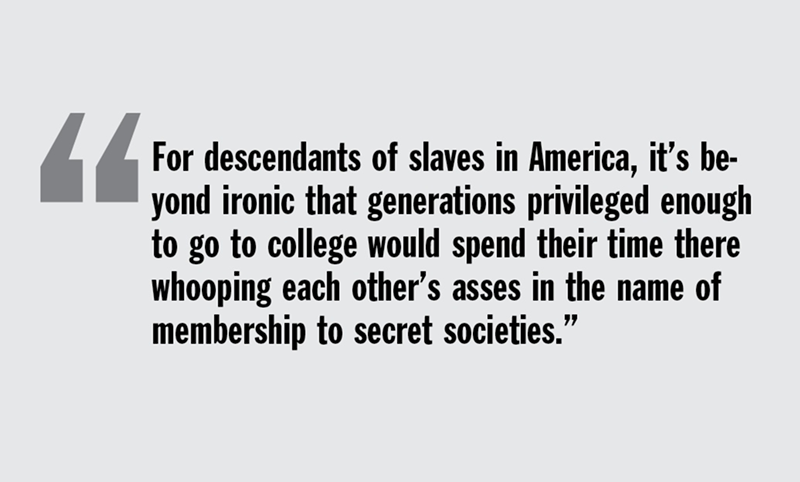I’d planned to see 12 Years a Slave but I wasn’t completely ready to see it when we went Saturday night during prime time, middle-class, middle-age date night.
Going prematurely to see a movie sure to cause psychic and emotional trauma is like being forced onto a rollercoaster before you’ve psyched yourself up for it: The last hill will be as unnerving as the first and every single lurch and neck-snapping quick turn will be a jolting surprise.
I wasn’t relaxed and couldn’t relax.
I’ve seen my share of these kinds of movies, seemingly the only ones Hollywood will “allow” black filmmakers to make.
Stop lying. You know the ones.
Black filmmakers “get” to make movies comprising the black experience so long as that experience includes the brutalities and the terrorism of slavery; the true-story-how-I-got-over-biopic (Lee Daniels’ The Butler; even Spike Lee’s Malcolm X); the cross-dressing “big mamma” morality tales of every formulaic Tyler Perry movie ever; the buddy/ensemble movie rife with C-list black actors on hiatus from said Tyler Perry movies, starring infidelity, class warfare and overblown narratives of black success (The Best Man; Soul Food, et. al); or, my favorite dark, twisted fantasy, the rape/incest/abuse survivor tale (Precious).
There are, of course, exceptions to every stereotype.
Daniels, a former casting director, gave us plenty of grist for the urban myth mill for why blacks get nominated and win Oscars when he produced Monster’s Ball.
The tired, retread rhetoric among blacks goes that Halle Berry only won her Oscar because she was sodomized by Billy Bob Thornton, and, for that matter, Denzel Washington won his two Oscars for portraying an ex-slave (Glory) and a sociopathic,murderous crooked cop (Training Day).
I do not subscribe to that argument because, all things comparable to white standards — and they mostly are in the black family of man — it negates the dramatic range of these and other black actors and there are plenteous white actors who win prestigious awards for playing similar characters.
The problem we blacks have when we go into darkened theaters is we’re too pious. We want Denzel “Dark Gable” Washington winning awards for playing only even, uncomplicated men and we want Halle Berry, whose real life narrative is far more complex and titillating than any role she’s played since Ball, to not have to take it up the ass to get critical acclaim.
I, for one, could take the wrung-out sexual metaphor to heart every single time I see a certain category of black movie because I go not so much to escape reality but to inch closer to it. I go for language and dialogue, narrative and how closely the movie reflects real, everyday life regardless if it’s “based on a true story.”
And since I have not seen big, exploding popcorn crunchers since my nephews were in elementary school, nearly everything I see is “real.”
The last time I knew — anticipated, actually — I was going to be raked over and wrung out was when I went to see Precious. I knew Daniels’ other directorial work to be somewhat obtuse and borderline experimental in casting and subject matter and that he didn’t always adhere to the obviousness of race other black directors subscribe to.
Plus, I knew the book by Sapphire and I wanted to see how her experiments with language and the filth of the subject matter could be translated. Joyously, I was bent out of shape when that movie was over and I was glad and proud a gay black man had told a black woman’s story of sexual, spiritual and intellectual brutality with such nuance.
Steve McQueen’s 12 Years a Slave was different because it is a true story and though I’ve read my share of slave narratives, reading is a private activity.
I do not like to experience the trauma of black pathos in the company of white people in a public theater.
There. I said it.
I’ve found that, in countless movie lobbies, white people pay an inordinate amount of attention to blacks waiting to see these kinds of films with them. It’s like they’re gauging the range of their own pity, guilt or empathy. They’re often overly friendly and chatty, like they’re prepping us to be distracted from the pain of a pending root canal or colonoscopy.
And all this makes me too self-aware and self-conscious, my mind on endless loops of women’s studies theory (what little I know), American history of the slave-holding South, pop culture criticism, Rap lyrics, Negro spirituals and family folklore of my maternal grandfather shooting at the Klan in the hills of West Virginia and my mother as a little girl refusing to step aside for whites in the deep South.
It makes me swoon and I am telling myself I should’ve waited for this movie to come to Redbox so I can watch in the privacy of my bedroom with the freedom to pause for guttural screams.
It’s all really too much for a quiet night in Clifton and the well-meaning white-haired whites who know nothing of my interior monologues.
In the pre-preview darkness I kept feeling someone’s stare.
It was the white man directly across the aisle from me.
Each time I looked over at him, he’d look away, only to stare again.
The small auditorium was jammed.
Just as the movie started, a middle-aged black woman entered, slowly guiding her aged mother, leaning on a wheeled walker, down the aisle to the seat in front of the staring white man.
As we watched our hero Solomon Northup endure 12 years of kidnap, beatings, witnessing rape, being forced to lash another slave and learning the subservience of slavery in order to survive it, I couldn’t keep my eyes off the old black woman.
Especially during the beating scenes.
She never flinched or looked away.
While the theater remained dark and moviegoers around us sniffled loudly as the credits rolled, I fled.
Enslaved of my own racial self-consciousness.
CONTACT KATHY Y. WILSON: [email protected]






